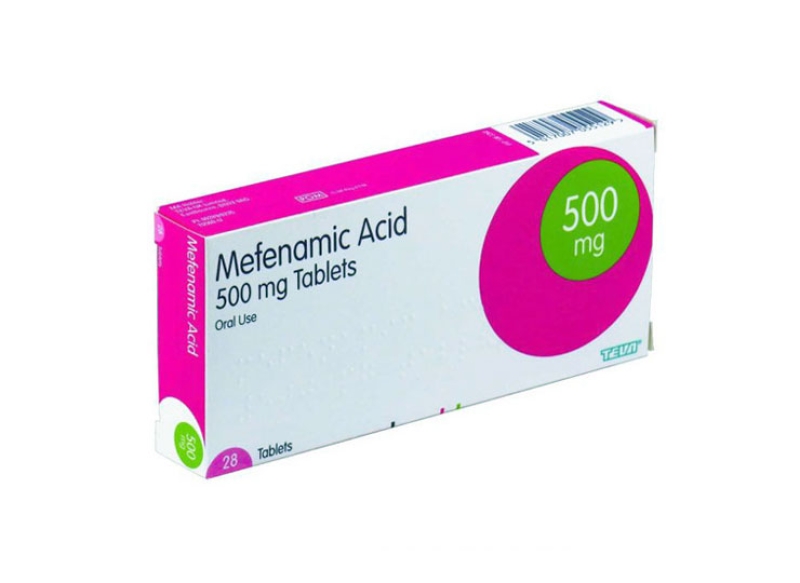Mefenamic acid belongs to a family of medicines called non-steroidal anti-inflammatory drugs (NSAIDs). It is used to treat period pain or abnormally heavy periods that are not adequately controlled by suitable lifestyle changes and use of other painkillers such as Ibuprofen and Paracetamol.
Women who have abnormally heavy or painful periods have been shown to have high levels of hormones called prostaglandins. These are known to cause cramping abdominal pain and are linked to heavy periods. Mefenamic acid work by stopping prostaglandins from being produced by certain enzymes. This causes prostaglandin levels in the body to drop. By reducing the production of prostaglandins, NSAIDs such as Mefenamic Acid reduce the contraction of the muscular wall of the uterus and subsequently reduce the pain experienced during a period.
Heavy periods, like period pain, can happen when your womb releases too much of the hormone prostaglandin. Mefenamic acid blocks the production of this hormone, causing your periods to become lighter. Mefenamic acid has been shown to reduce heavy bleeding by between 20 to 50%.
The recommended dose isTWO 250mg capsules THREE times a day for up to a maximum of THREE days during any one single period at the onset of period pain or bleeding, whichever comes earlier. Stop taking the medicine once your period becomes lighter or your pain becomes manageable.
If you miss a tablet, do not take two at once. Again, this may cause you to have reactions. Instead, continue with the next dose as normal. The dose should never exceed what is recommended as the risk of a stomach ulcer or a gastrointestinal bleed is higher above that dose.
It’s a good idea to eat something before taking mefenamic acid, as it could give you an upset stomach if you take these tablets on an empty stomach. Long term users will normally be prescribed a Proton pump inhibitor like Omeprazole or Esomeprazole to protect the patient from stomach ulcers and/or bleeds.
Mefenamic acid takes between 2 - 4 hours to kick in and start easing your period pain. Each 500mg dose of mefenamic acid kills pain for up to 8 hours, so you may need to take it two or three times a day for all-day relief.
Always use this medication exactly as your clinician has told you. Check with our clinical team or your GP or pharmacist if you are not sure.
Medicines and their possible side effects can affect individual people in different ways. The following are some of the side effects that are known to be associated with this medicine. Just because a side effect is stated here, it does not mean that all people using this medicine will experience that or any side effect.
Common side effects of mefenamic acid include:
- stomach pain
- feeling sick
- bowel problems, like constipation or diarrhoea
- feeling dizzy and/or sleepy
- a ringing sound in your ears (tinnitus)
- headache
- heartburn
For full information on side effects and correct use, see the patient information leaflet. If any side effects concern you, or you are experiencing any of the side effects mentioned in the patient information leaflet whilst taking this medication, please contact our clinical team or speak to your GP.
Mefenamic acid can also cause some more serious side effects, which require urgent medical attention. If you start getting any of the below side effects after taking mefenamic acid, stop taking them and go to A&E as soon as possible
- vomiting
- breathing difficulties
- swelling of the skin or rash
- chest pain
Do not take Mefenamic Acid and Alcohol together. For any reason that they need to be taken together, talk to your doctor first. Alcohol can increase the risk of stomach symptoms such as bleeding, when taken in combination. If you experience this, call your doctor immediately.
Bleeding in the stomach or intestine symptoms include:
- Black, blood or tarry stools
- Vomiting or coughing up blood
- Vomit that specifically looks like coffee grounds
If you are pregnant then you should consult your doctor before taking Mefenamic acid. It is definitely not suitable for those in the last 3 months of pregnancy, but effects on the baby in the first 6 months are not known. This means it’s not usually recommended but your doctor may prescribe it to you if they feel it necessary. However, you should not take Mefenamic acid if you are trying to get pregnant, as the drug will make it more difficult.
If you are breastfeeding then you should be aware that Mefenamic acid can be passed into your breast milk and should therefore not be taken during this time unless expressly instructed to do so by your doctor.
Get emergency medical help if you have signs of an allergic reaction to this medication. These include:
- Hives
- Dizziness
- Fast or pounding heartbeats
- Wheezing
- Difficult breathing
- Swelling of your face, lips, tongue, or throat.
It is important that you let us know which prescription, over-the-counter medicines and recreational drugs you are currently taking. You must also tell us about any other medical conditions that you currently have (or had in the past). This will help us ensure the prescribed medication is safe and appropriate for you to take.
For full information on warnings, medication interactions and contraindications, refer to the Patient Information Leaflet. Please read all packaging and the Patient Information Leaflet before taking any new medicine and inform our clinical team or your GP of medicines you are taking or intend to take.







